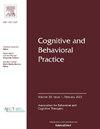Compatibility of Components in Cognitive Behavioral Therapies: A Call for Combinatory Congruency
IF 2.9
3区 心理学
Q1 PSYCHOLOGY, CLINICAL
引用次数: 0
Abstract
A large minority of psychotherapists endorse practicing integrative therapy, drawing from different schools of therapy, and an increasing number of contemporary therapies are designed by combining elements or components from different treatment models (e.g., modular treatments, process-based therapy). As a result, clients are likely to be the recipients of a number of different techniques or strategies, based on different theoretical models, emphasizing different change principles. This paper sets out to explore the potential challenges introduced by integrative treatments, exemplified with the diverse therapies found under the umbrella of cognitive behavioral therapies (CBTs). Although several scholars have proposed a unifying agenda for CBTs by underscoring commonalities and shared change principles, which is an important perspective, the extent to which compatibility exists between CBTs remains an underexplored scientific question. In this paper, we argue that integrative therapy can risk detracting from a positive outcome when the compatibility between distinct strategies or components is not ensured. We call for practitioners and researchers to ensure combinatory congruency, that is, compatibility between components manifested as their efficient and effective delivery together. We conclude by suggesting ways in which combinatory congruency can be established in the design phase of an integrative treatment or as an important step in additive and dismantling studies of existing integrative treatment packages.
认知行为疗法中各组成部分的兼容性:对组合一致性的呼吁
少数心理治疗师赞同采用综合疗法,借鉴不同的治疗流派,越来越多的当代疗法是通过结合不同治疗模式的元素或组成部分(如模块化治疗、基于过程的治疗)来设计的。因此,求助者很可能成为基于不同理论模式、强调不同改变原则的多种不同技术或策略的接受者。本文以认知行为疗法(CBTs)下的各种疗法为例,探讨综合疗法可能带来的挑战。尽管一些学者通过强调共性和共同的改变原则为 CBT 提出了一个统一的议程,这是一个重要的视角,但 CBT 之间的兼容性究竟有多大,仍然是一个尚未充分探索的科学问题。在本文中,我们认为,如果不能确保不同策略或组成部分之间的兼容性,整合疗法就有可能影响积极的治疗效果。我们呼吁从业人员和研究人员确保组合的一致性,即各组成部分之间的兼容性,表现为它们共同提供高效和有效的治疗。最后,我们提出了在综合疗法的设计阶段建立组合一致性的方法,或将其作为对现有综合疗法包进行添加和拆分研究的重要步骤。
本文章由计算机程序翻译,如有差异,请以英文原文为准。
求助全文
约1分钟内获得全文
求助全文
来源期刊

Cognitive and Behavioral Practice
PSYCHOLOGY, CLINICAL-
CiteScore
4.80
自引率
3.40%
发文量
118
审稿时长
84 days
期刊介绍:
Cognitive and Behavioral Practice is a quarterly international journal that serves an enduring resource for empirically informed methods of clinical practice. Its mission is to bridge the gap between published research and the actual clinical practice of cognitive behavior therapy. Cognitive and Behavioral Practice publishes clinically rich accounts of innovative assessment and diagnostic and therapeutic procedures that are clearly grounded in empirical research. A focus on application and implementation of procedures is maintained.
 求助内容:
求助内容: 应助结果提醒方式:
应助结果提醒方式:


